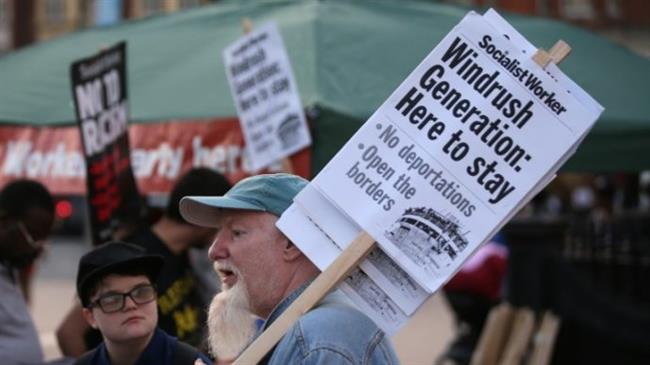1,000 highly skilled migrants in the UK are wrongly facing deportation
While the recent Windrush crisis has caused controversy and the loss of a minister for the British government, new revelations show that 1,000 highly skilled migrants in the UK are wrongly facing deportation based on flawed allegations.
The immigrants who are seeking indefinite leave to remain (ILR) are facing expulsion under a section of the British Immigration Act designed in part to tackle terrorists and individuals judged to be a threat to national security.
A range of MPs and immigration experts have criticized the use of the controversial section 322(5) of the act, with two saying the crisis-hit department is truly wicked and abusing its power.
“The litany of callous incompetence by the Home Office has been laid bare in the past few weeks, first with the Windrush scandal and now with the revelations regarding removal targets,” said Alison Thewliss MP for Glasgow Central.
“The way that the 322(5) rules are being applied is similarly malevolent, and I urge the government to get their house in order before any more lives are needlessly ruined.”
Experts say the highly skilled workers – including teachers, doctors, lawyers, engineers and IT professionals – are being refused ILR after being accused of lying in their applications either for making minor and legal amendments to their tax records, or having discrepancies in declared income.
In one case, the Guardian reports, the applicant’s tax returns were scrutinized by three different appeal courts who had found no evidence of any irregularities. The same figures are nevertheless used as the basis for a 322(5) refusal because of basic tax errors allegedly made by the Home Office itself.
Professionals deported for nothing
Cases include a former Ministry of Defence mechanical engineer who is now destitute, a former NHS manager currently £30,000 in debt, thanks to Home Office costs and legal fees, who spends her nights fully dressed, sitting in her front room with a suitcase in case enforcement teams arrive to deport her, and a scientist working on the development of anti-cancer drugs who is now unable to work, rent or access the NHS.
Saleem Dadabhoy, a scion of one of the wealthiest families in Pakistan, is facing deportation under section 322(5) despite three different appeal courts having scrutinized his accounts and finding no evidence of any irregularities, and a court of appeal judge having ruled that he is trustworthy and credible. His deportation would directly lead to the loss of 20 jobs, all held by British citizens, and the closure of a British company worth £1.5m.

Dadabhoy’s lawyer says the Home Office has made two basic accounting errors, comparing his client’s gross income to his net income, and comparing his tax return from an April to April tax year to a return from his December to December accounting year. They have used the inevitable discrepancy in income as evidence that he has submitted inaccurate figures.
Paul Garlick, a former Queen’s Counsel who specialises in extradition and human rights law, and was a part-time judge at the crown court in London said: “The decisions of the Home Office are beyond belief and deplorable.
“The system is crippled by not having enough people to do the work while those who are there, don’t understand the basics,” he added.
“They genuinely have no idea of the difference between tax years and accounting years, or what is a legitimately deductible expense.
“My feeling is that since Theresa May’s announcement of a ‘hostile environment’ for immigrants, caseworkers have been told to look for discrepancies that could form the basis of an accusation the applicant is lying, because that’s the quickest way to dispose of an application.”
Afzal Khan MP, the shadow minister for immigration, elaborated on the government’s immigration policy slamming “migration targets”: “Driven by a misguided net migration target, the Home Office has gone after what they perceive as easy targets in the form of the Windrush generation and highly skilled migrants.”
“Going after NHS doctors, lawyers, teachers and engineers on the basis of tax errors is another example of the misguided injustice of the Home Office.”
Amber Rudd resignation
Monday last week, British Prime Minister Theresa May accepted the resignation of her Home Secretary, Amber Rudd, following mounting pressure on the secretary to resign over the Windrush scandal.
Rudd was due to address MPs last week and face a barrage of questions about why she claimed to be unaware of “deportation targets.”
But on Sunday night she telephoned May to tell her of the decision to resign amid intensifying opposition demands for her to quit.
Rudd’s resignation comes after an explosive memo emerged which suggested she was actually aware of illegal immigrant removal targets, despite telling the country’s parliament otherwise.
Windrush scandal
For nearly a month, British ministers have been struggling to explain why some descendants of the "Windrush generation", who were invited to Britain to plug labor shortfalls between 1948 and 1971, had been labeled illegal immigrants.
Much like Dreamers who were brought to the United States as children, many immigrant kids who arrived in the United Kingdom from the Caribbean and other former British colonies a half-century ago face an uncertain future.
They are the descendants a generation, named after a ship — the MV Empire Windrush — that docked in the UK in June 1948 with cleaners, bus drivers, bricklayers and nurses from Jamaica, Trinidad and Tobago and other British territories as labor who would reconstruct war-ravaged Britain.
They arrived in the UK legally under previous freedom of movement laws for nationals of the Commonwealth, an intergovernmental organization of 53 member states that were mostly former territories of the British Empire. The immigrants did not need elaborate documentation or proof of British citizenship. Many never registered and did not obtain papers or documents of citizenship.
Changes to migration rules mean those who lack documents are now being told they need evidence to continue working, access key services or even remain in the UK
The new rules on immigration mean some of these immigrants are now being classified as illegal. They have faced deportation threats and in some cases stripped of their rights to access health care, employment and pensions.
Iran to host AALCO conference on countering terrorism
Explainer: Why is Yemeni drone boat ‘Tufan al-Modammer’ a prized military asset?
American democracy: Voters to pick between two poisons, strychnine or cyanide
German intelligence chief meets with Hezbollah deputy head as tension with Israel escalates
VIDEO | Press TV's news headlines
VIDEO | Iran marks 36th anniv. of US downing of passenger plane in Persian Gulf
Deal with Russia heralds Iran as regional gas hub
VIDEO | Patients forced out of Gaza’s European hospital after Israel's evacuation order












 This makes it easy to access the Press TV website
This makes it easy to access the Press TV website